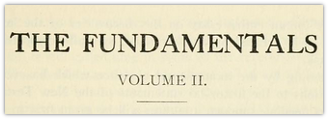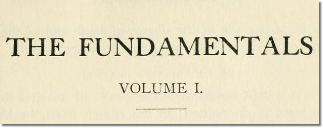The Inspiration of the Bible - Definition, Extent and Proof
[node:22019 collapsed body]

CHAPTER I. THE INSPIRATION OF THE BIBLE— DEFINITION, EXTENT AND PROOF
BY REV. JAMES M. GRAY, D. D., DEAN OF MOODY BIBLE INSTITUTE, CHICAGO, ILL.
As iron sharpens iron,
one person sharpens another. (Proverbs 27:17)
[node:22019 collapsed body]

CHAPTER I. THE INSPIRATION OF THE BIBLE— DEFINITION, EXTENT AND PROOF
BY REV. JAMES M. GRAY, D. D., DEAN OF MOODY BIBLE INSTITUTE, CHICAGO, ILL.
[node:22019 collapsed body]

CHAPTER VII. TRIBUTES TO CHRIST AND THE BIBLE BY BRAINY MEN NOT KNOWN AS ACTIVE CHRISTIANS.
“Their rock is not as our Rock, even our enemies themselves being judges.”—Deut. 32:31.
[node:22019 collapsed body]

CHAPTER VI. JUSTIFICATION BY FAITH.
BY H. C. G. MOULE, D. D., BISHOP OF DURHAM, ENGLAND.
[node:22019 collapsed body]

CHAPTER V. MODERN PHILOSOPHY.
BY PHILIP MAURO, COUNSELLOR-AT-LAW, NEW YORK CITY.
[node:22019 collapsed body]

CHAPTER IV. CHRIST AND CRITICISM.
BY SIR ROBERT ANDERSON, K. C. B., LL. D. AUTHOR OF “THE BIBLE AND MODERN CRITICISM,” ETC., ETC., LONDON, ENGLAND.
[node:22019 collapsed body]

CHAPTER III. FALLACIES OF THE HIGHER CRITICISM.
BY FRANKLIN JOHNSON, D. D., LL. D.
[node:22019 collapsed body]

CHAPTER 2: THE RECENT TESTIMONY OF ARCHAEOLOGY TO THE SCRIPTURES.
BY M. G. KYLE, D. D., LL. D., EGYPTOLOGIST. PROFESSOR OF BIBLICAL ARCHAEOLOGY, XENIA THEOLOGICAL SEMINARY. CONSULTING EDITOR OF THE RECORDS OF THE PAST, WASHINGTON, D. C.
[node:22019 collapsed body]

CHAPTER I. THE TESTIMONY OF THE MONUMENTS TO THE TRUTH OF THE SCRIPTURES.
BY PROF. GEORGE FREDERICK WRIGHT, D. D., LL. D., OBERLIN COLLEGE.
 [node:22019 collapsed body]
[node:22019 collapsed body]
CHAPTER VII. A PERSONAL TESTIMONY.
BY HOWARD A. KELLY, M. D.
(To those who have believed that faith in the Bible and the God of the Bible does not harmonize with the modern scientific spirit the following testimony from a distinguished physician and surgeon should be of great value.
The Editor of Appleton’s Magazine says of Dr. Kelly:
 [node:22019 collapsed body]
[node:22019 collapsed body]
CHAPTER VI. THE HISTORY OF THE HIGHER CRITICISM.
BY CANON DYSON HAGUE, M. A., RECTOR OF THE MEMORIAL CHURCH, LONDON, ONTARIO. LECTURER IN LITURGICS AND ECCLESIOLOGY, WYCLIFFE COLLEGE, TORONTO, CANADA. EXAMINING CHAPLAIN TO THE BISHOP OF HURON.
What is the meaning of the Higher Criticism? Why is it called higher? Higher than what?
At the outset it must be explained that the word “Higher” is an academic term, used in this connection in a purely special or technical sense. It is not used in the popular sense of the word at all, and may convey a wrong impression to the ordinary man. Nor is it meant to convey the idea of superiority. It is simply a term of contrast. It is used in contrast to the phrase, “Lower Criticism.”
One of the most important branches of theology is called the science of Biblical criticism, which has for its object the study of the history and contents, and origins and purposes, of the various books of the Bible. In the early stages of the science Biblical criticism was devoted to two great branches, the Lower, and the Higher. The Lower Criticism was employed to designate the study of the text of the Scripture, and included the investigation of the manuscripts, and the different readings in the various versions and codices and manuscripts in order that we may be sure we have the original words as they were written by the Divinely inspired writers. (See Briggs, Hex., page 1.) The term generally used now-a-days is Textual Criticism. If the phrase were used in the twentieth century sense, Beza, Erasmus, Bengel, Griesbach, Lachmann, Tregelles, Tischendorff, Scrivener, Westcott, and
Discussion